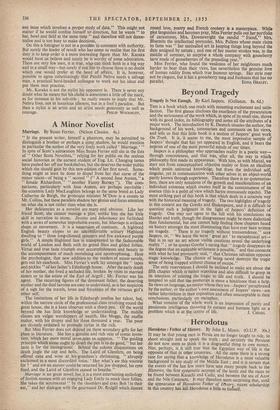A Minor Novelist
Marriage. By Susan Ferrier. (Nelson Classics. 4s.) " IF the present writer, himself a phantom, may be peimitted to distinguish a brother or perhaps a sister shadow, he would mention in particular the author of the very lively work called Marriage.' " In spite of Scott's admiration Miss Susan Ferrier still sits in the lists of " Other Scots Novelists," relying for her public on the zealous social historian or the earnest student of Eng. Lit. Changing tastes have pushed her off our bookshelves, but she deserves the wider public which she should gain by this new edition of her first novel. Some- thing might at least be done to dispel from her that curse of the minor talent—of being a " second " (" A second Jane Austen," a " female Richardson," " another Fanny Burney "). The com- parisons, particularly with Jane Austen, are perhaps inevitable : the eccentric Lady MacLaughlan belongs to the same breed as Lady Catherine de Burgh, the grotesque minister M'Dow is a cousin to Mr. Collins, but these parallels shadow her genius and focus attention on what she is not rather than what she is.
Her deficiencies as a novelist are many and obvious. Like her friend Scott, she cannot manage a plot, unlike him she has little skill in narration to atone. Destiny and Inheritance are furbished with a series of somewhat improbable events, but Marriage is without shape or movement. It is a succession of contrasts. A highbred English beauty elopes to an uncomfortable solitary Highland dwelling to " three long-chinned spinsters and five awkward purple girls." A simple Highland lass is transplanted to the fashionable world of London and Bath with its grand fetes and gilded follies. Virtue and true taste triumph over accomplishments and beauty to the accompaniment of much moralising and apostrophising. Here the psychologist, that new addition to the readers of minor novels, gets out his casebook. Miss Ferrier's walk lay amongst the " tapes and pickles " of her father's Edinburgh house. After the early death of her mother, she lived a secluded life, broken by visits to married sisters or to the estate of the Earl of Argyll ; Mr. Ferrier was his agent. The recurring figures of the dominant father, the deserting mother and the dual heroine are easy to understand, as is her suspicion of a sigh for the travels, loves and frivolities of the virtuous girl's other self.
The limitations of her life in Edinburgh confine her talent, but, within the narrow circle of the professional class revolving round the great house, she is a keen observer with a sharp pen. Of the world beyond she has little knowledge or understanding. The middle classes are vulgar worshippers of wealth, like Moggs, the muffin maker, with his dropsy and his three thousand a year. The poor are divinely ordained to promote virtue in the rich. But Miss Ferrier does not depend on these secondary gifts for her place in literature. She has a genuine and rich vein of comic inven- tion, which her stern moral sense tries to suppress. " The guiding principle which alone ought to direct the pen is to do good," but her taste is for the incongruous. Behind the solemn disquisitions on death jingle the cap and bells. The Laird of Glenfern, on being offered cake and wine at his grandson's christening, " abruptly exclaimed in a most discordant voice, Hey what's aw this waistrie for ? ' and ere an answer could be returned his jaw dropped, his eyes fixed, and the Laird of Glenfern ceased to breathe." Marriage is no great novel, but it is a most entertaining anthology of foolish women with an engaging Lady Emily to mock'their follies. She takes the sentimental " by the shoulders and cries Boh ! in their ear," and her dialogue with the gourmand Dr. Redgill which dances round love, poetry and French cookery is a masterpiece. While plot languishes and heroines pray, Miss Ferrier pulls out her portfolio of caricatures, Mrs. Downewright the candid " friend," Mrs. Bluemits the intellectual pretender, Mrs. Miens whose main claim to fame was " her unrivalled art in keeping things long beyond the date assigned by nature ; and one of her master strokes was, in the middle of summer, to surprise a whole company with gooseberry tarts'made of gooseberries of the preceding year.
Miss Ferrier, who found the weakness of her neighbours much harder to bear than their vices, has nevertheless the genuine love of human oddity from which true humour springs. Her style may not be elegant, but it has a gooseberry tang and freshness that has no


































 Previous page
Previous page